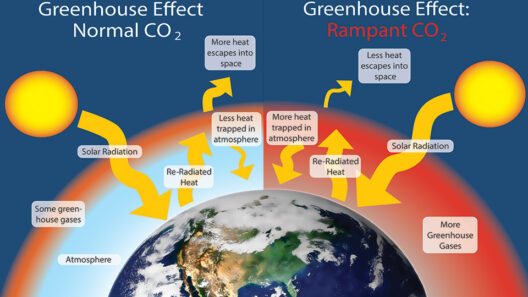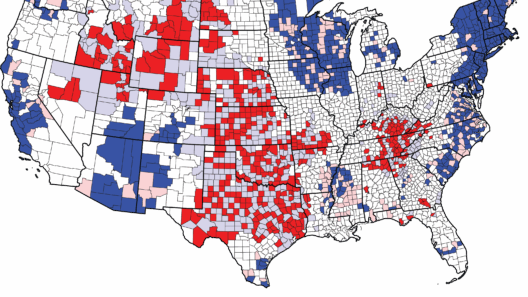Climate change stands at the nexus of science and politics, illustrating the often tumultuous relationship between empirical evidence and ideological beliefs. Just as a tempest can be approached with cautious respect or dismissive derision, so too can the discourse surrounding climate change spawn a myriad of reactions—from fervent advocacy to vehement skepticism. This discourse is laden with a perplexing amalgamation of scientific inquiry, socio-political agendas, and cultural narratives that render climate change not merely an environmental issue but a philosophical battleground.
At its core, climate change is a scientific phenomenon, rooted in the indisputable laws of thermodynamics and the greenhouse effect. Carbon dioxide and other greenhouse gases envelop the earth, trapping heat and leading to a rise in global temperatures. The scientific community presents a wealth of data, empirically demonstrating rising sea levels, decreasing ice sheets, and increasingly erratic weather patterns. These indicators weave an ominous narrative of ecological degradation that demands immediate action. Yet, paradoxically, this robust scientific consensus does not uniformly translate into a societal acceptance of the urgency of climate action.
The subtle friction between robust scientific evidence and public perception often emerges in political arenas, where climate change has become an ideological litmus test. Political actors utilize climate science as a tool for both policy-making and political maneuvering. This duality illustrates a fundamental truth: while the scientific community may produce verifiable facts, these facts become entangled in a web of partisan interests and emotional narratives. This entwinement can transform the straightforward equation of rising carbon emissions leading to warming into a complex moral debate.
To understand the controversy, we must examine the psychological mechanisms at play. Cognitive dissonance arises when individuals confront evidence that contradicts their preexisting beliefs. This psychological phenomenon can lead to a defensive posture— fuelling climate change denial as a means of reconciling conflicting ideas. For many, particularly those who feel economically threatened by policies aimed at mitigating climate change, rejecting climate science becomes an act of self-preservation, an “us versus them” mentality that prioritizes short-term gain over the long-term health of our planet.
The metaphor of a ship navigating through fogpowerfully encapsulates the climate discourse. The ship represents humanity, while the fog symbolizes the myriad uncertainties and complexities surrounding climate change. As scientific instruments gauge the disturbances of the environment, some crew members chart a course towards sustainability, utilizing the data to guide their decisions. Yet, others, cloaked in ideological fog, may be led astray, clinging to ineffective navigational maps that favor their vested interests. This disconnect reveals a fundamental dilemma: the perils of collective action versus the seductive allure of individualism.
This divergence can also be seen in the realm of economics. Climate change embodies a fascinating paradox, where the pursuit of economic growth often clashes with environmental stewardship. The fossil fuel industry has long stood as a behemoth within the global economy, providing livelihoods and energy for billions. However, this reliance comes at a significant environmental cost. Politicians may romanticize fossil fuel dependency as a keystone of national identity or economic viability, even in the face of an overwhelming body of evidence advocating for a transition to renewable energy. This push-and-pull indicates that economic interests are deeply seated in the political discourse surrounding climate change.
In addition to economic and psychological factors, cultural narratives shape perceptions of climate change, embedding the issue within larger societal discourses. The framing of climate change—whether as a harbinger of doom or a call to action—affects public engagement. In some cultures, climate change is interpreted through a religious lens, viewed as a divine calamity or a test of humanity’s stewardship of the earth. Such interpretations can polarize communities, instilling a sense of urgency among certain factions while fostering apathy in others. Consequently, the narrative surrounding climate change is not simply scientific but also deeply entwined with cultural values, beliefs, and moral imperatives.
Moreover, misinformation campaigns often infect the public sphere, further muddying the waters of rational discourse. Tailored propaganda, disseminated through social media and other outlets, can distort scientific facts. Such tactics can manufacture doubt and create an environment where polarized citizens feel justified in dismissing scientific consensus. The role of social media as an amplifier of misinformation exemplifies the modern dilemma of navigating truth in a digital landscape rife with fallacies and echo chambers.
Despite the overwhelming evidence of human-induced climate change, its harmless victims often become collateral damage in high-stakes political ventures. Marginalized communities, particularly those in developing nations or economically vulnerable positions, often face the brunt of climate-related disasters. They bear witness to rising sea levels, droughts, and extreme weather—phenomena they have contributed to the least yet are impacted the most. This stark reality underscores the moral imperative of addressing climate change, as it poses profound ethical questions about justice, equity, and responsibility.
In conclusion, the controversy surrounding climate change emerges from an intricate dance between science and politics, belief and action. Navigating this labyrinth demands a collaborative approach, one that transcends partisan divides and invites voices from all walks of life. While the tempest may rage on, the need for transparent dialogue grounded in sound science remains paramount. The ship may still be beleaguered by fog, but united efforts can illuminate a pathway to a sustainable future—one where scientific understanding prevails over denial, and collective empowerment rises in the face of adversity. As stewards of the earth, it is our responsibility to advocate for policies that prioritize ecological balance, ensuring that the legacies we leave do not drown in the very waters we sought to navigate.








